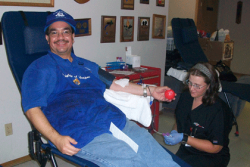Knights of Columbus first in line to donate blood

AMERICAN FORK — In his 1984 remarks on "Blood and Organ Donors," Pope John Paul II said: "In giving blood or an organ of your body, may you always have this human and religious perspective: may your gesture be made as an offering to the Lord, who identified himself with those who suffer... May it be a gift made to the suffering Lord, who in his passion gave himself completely and poured out His blood for the salvation of mankind." Even though donating blood is a very noble act and doesn’t require as much sacrifice as donating an organ, hospitals still run the risk of low blood supply, especially during the summer. "Less people are donating blood because they’re on vacation; and there are also more recreational accidents, which increase the demand for blood," said Katie Hogan, phlebotomist for ARUP. The dispositions of good Samaritans like Marisol Gamez make blood drives a fruitful effort. "This is the first time I donated blood. I don’t like needles; but if I can help, I will do it, even if it involves needles," said Gamez during the blood drive hosted by the Knights of Columbus Council 8606 at the Msgr. Dowling Hall at St. Peter Parish in American Fork July 19. Donating blood was not what Gamez, expected. "I thought it would be fast. That they would fill a tube with my blood and that was it," she said. The procedure to draw blood from the arm only takes six to ten minutes, but the screening and collection process could take up to an hour. So, if someone would like to be a blood donor, he or she should plan on spending 45 to 60 minutes at the blood drive site. Potential donors should also bring a form of identification and fill certain requirements. They should be at least 17 years old (minors must have parental permission), be in good health, and not have taken aspirin or aspirin-containing products 72 hours prior to making a donation. "They should weigh more than 110 pounds, otherwise they might not have enough blood in their body to donate. They should also report if they have been out of the country in the past three years. Most countries are okay, but if you’ve visited certain countries, we would like you to wait," said Sandi Hooker, phlebotomist. Additionally potential donors are asked not to donate if they: • Have cold or flu symptoms or do not feel well the day of donation. • Have taken oral antibiotics in the past seven days (those used to treat acne are exempt). • Have had hepatitis after the age of 11. • Have received a blood transfusion within the past 12 months. • Have had a tattoo, body piercing, acupuncture, an accidental needle stick or have come in contact with someone else’s blood in the past 12 months. • Have had malaria or have traveled to a malarial-risk area within the past year. • Are pregnant. • Have been treated for syphilis or gonorrhea in the past year. • Have ever used a needle to inject nonprescription drugs (including steroids). • Have or are at risk for HIV, the virus that causes AIDS. After the requirements and restrictions, only 37 percent of people are eligible to donate blood; and only three to four percent of eligible donors actually donate each year. "The knights are highly supportive of blood drives since many are military veterans and are aware of the importance of having blood ready for when people need it," said Michael Glenn, deputy grand knight and co-chairman. The knights of Council 6806 have held the blood drive annually, but will now host it more frequently. "We will try to have it twice a year. Every donor can donate blood every two months, so holding the blood drive every six months will be better for the collection of blood," said Glenn. Blood donors received a free breakfast from the donors as an incentive, but Glen said he hopes more people are drawn to donate for more intangible reasons. "People should remember there is no substitute for real blood. A pint can help up to five people when it gets split up into blood’s different components. Whole blood could potentially save a life," he said.
© Copyright 2025 The Diocese of Salt Lake City. All rights reserved.

Stay Connected With Us